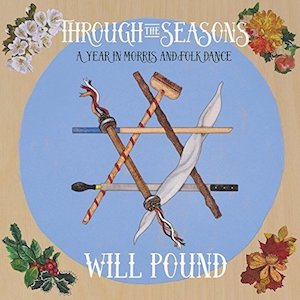 Will Pound – Through the Seasons: A Year in Morris and Folk Dance
Will Pound – Through the Seasons: A Year in Morris and Folk Dance
Lulubug Records – 4 May 2018
Through the Seasons is that rarest of beasts in the folk world, an Arts Council England supported project. To be accurate, it’s two of these rare beasts, a 12-track album and a tour with Will Pound, Benji Kirkpatrick and Ross Grant performing the tunes, interweaved with stories told by Debs Newbold. Having had the pleasure this week of listening to the album and seeing the performance at Portsmouth’s Square Tower I can assure you that the two dovetail splendidly. The album presents the tunes with big arrangements, taking full advantage of an array of guest musicians, while Debs’ ebullient style of storytelling and David Parker’s animations, projected on a screen above the musicians, give the show an unforgettable visual impact, creating a piece of theatre, not simply a musical performance.
The album title stems from the primary aim of the project, tying dance to the seasons of the year, but Will’s notes reveal he’s harboured several further aims. He’s chosen tunes for the album that accompany a variety of dance styles giving listeners who come to the album without much prior knowledge of folk dance a glimpse of the range encompassed by the tradition. Even more apparent to the casual listener is the care taken to devise arrangements that show, in Will’s words, “how much musicality these tunes have, though they are often lost behind the dance”.
The first four tracks all feature tunes that frequently accompany dances from the Cotswold tradition. The two tunes of the opener, Getting Upstairs/Rodney, set the scene nicely, taken at a fast pace by the three core musicians. Will’s principal instrument for the album is his melodeon but, on this track, we’re treated to his trademark harmonica as well. Benji plays the bouzouki, initially providing the underlying rhythm. As the track builds Ross’s fiddle takes its turn with the melody as does the bouzouki. The speed at which the tunes are taken could well defeat many a dance side but as music to get you in the mood for this album, it could hardly be bettered. The Quaker is a rather more sedate tune, associated with Whit Monday celebrations in the village of Bampton in the Bush in Oxfordshire, Will, again, taking the lead on melodeon although, as he notes, the tune was traditionally played on fiddle. Ross’s fiddle does eventually get to lead the melody for its final run through.
Although its source is still Oxfordshire, the next tune is rather different, Will giving Trunkles, from the village of Kirklington, an arrangement for solo melodeon. The quartet of Cotswold tunes closes with the album’s only vocal track, The Nutting Girl, with Eliza Carthy joining Will. She both sings the somewhat saucy lyrics in her inimitable style and plays fiddle in an arrangement that gives free reign to both fiddle and Will’s melodeon once Eliza has sung the final chorus. For the final two and a half minutes the instruments weave variations around each other, a song and a dance tune in the one track.
After Cotswold, it’s the turn of the North West tradition to feature and Will has chosen to highlight its association with summer carnivals. It’s now instantly recognised as the Monty Python signature tune but The Liberty Bell March was originally a brass band piece and also widely used for North West Clog dancing. Will’s arrangement features John Kirkpatrick on button accordion with Will on harmonica, he also adds drums and additional percussion comes from his clogs. The second North West tune Brighton Camp/Salmon Tails relates to another summer tradition, parading a cart piled high with rushes intended for strewing on church floors. The churches may no longer need the rushes but the parade tradition lives on in places such as Saddleworth. Will is back on melodeon for this track and, in addition to Benji and Ross, the arrangement includes trumpet from Hugh Rashleigh and trombone from Patrick Kenny.
The Border Morris of Shropshire, Worcestershire and Herefordshire features next, first with Fanny Frail a strongly percussive piece, well matched to the clattering stick work of the associated dance. It’s most notably Benji, on banjo, providing this element of the arrangement. Not for Joe sees the second appearance for John Kirkpatrick, this time on concertina, combining with Will who’s playing both melodeon and harmonica.
Benji gives us more banjo as he, Will and Ross give a nod to the Molly dance tradition of East Anglia with The College Hornpipe. The remaining tracks highlight the rather different dance traditions of rapper and longsword. Blackthorn Stick/Irish Washerwoman was recorded live with the Newcastle Kingsmen performing the dance accompanied by Will on harmonica and Suzanne Fivey on piano. Featuring these tunes reinforces the point that English traditional dances have always happily borrowed tunes from elsewhere, Irish tunes especially being well suited to the livelier dances such as this. The final track expands on this, the Papa Stour Sword Dance belongs to the Longsword tradition whilst hailing from Shetland. Will has devised an arrangement with himself contributing both harmonica and melodeon alongside fiddles from Ross Couper, himself a Shetlander, and Patsy Reid from Perthshire.
Will has long dreamed of putting together an album celebrating the range of music that accompanies English folk dance. With Through The Seasons he’s succeeded splendidly. Sure, you can learn a lot from listening together with Will’s sleeve notes, but just listen and the music proves to be irresistible. He’s been well equipped to make it so by enlisting an array of top-flight musicians. Clearly, his enormous enthusiasm for traditional dance has enticed the very best into his project. Together, they’ve produced arrangements that are fresh, exciting, at times complex, at times elegantly simple. Through The Seasons will open many people’s eyes to the power of traditional English dance music.
More details here: http://willpound.com/throughtheseasons/

